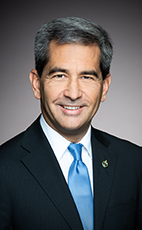Mr. Speaker, yesterday, in committee, we saw that the Liberals would rather write the defence policy behind closed doors without being disturbed.
That is dangerous because we are aware of the Liberals' intense hatred for the Canadian Armed Forces. The Liberals gave us submarines that take on water and helicopters that do not take off.
Can the minister confirm that Canada's defence policy is not cast in stone and that all interested parties will be heard by the Standing Committee on National Defence?

